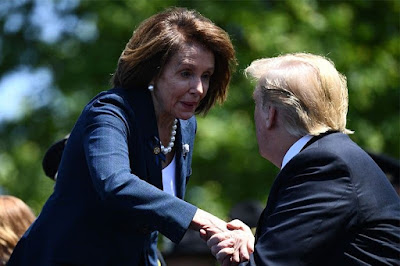WASHINGTON, United States — President Donald Trump's State of the Union address became a shocking display of US divisions Tuesday with Democrats protesting the Republican's boasts before their leader, Nancy Pelosi, ripped up her copy of the speech on live television.
The House speaker's gesture at the very end encapsulated the seething atmosphere in the Capitol as Trump made a one hour and 18 minutes pitch for a second term in office.
Instead of what traditionally has been an annual moment for political truce, this State of the Union mirrored the political war raging through the country ahead of November elections.
Trump was still on the podium, having just completed the soaring finale to his speech when Pelosi, standing just behind him, raised the papers and demonstratively tore them to pieces.
"It was the courteous thing to do, considering the alternatives," she told a reporter afterwards.
The speech began with as much rancor as it ended, when Trump ignored past custom and declined to shake hands with Pelosi, who as speaker of the House of Representatives had overseen the push to impeach Trump for abuse of office.
She put out a hand and Trump turned away, leaving her arm in thin air.
Democrats responded to Trump's speech, where he proclaimed a "great American comeback" and touted his achievements, by refusing to follow Republicans in repeated standing ovations. There was booing and several Democrats walked out.
"The president has no class," House Democrat Jim McGovern told reporters afterwards. "I mean, he should have, out of respect, taken the speaker's hand."
"But after delivering what essentially was a campaign rally speech that was terribly dark and divisive, I think the speaker did the right thing ripping it up."
Underlying all the tension was the fact that after months of impeachment investigations in the Democratic-led House, the Republican majority Senate is now almost certain to acquit Trump on Wednesday.
But Trump's speech did not once mention the word "impeachment."
Right-wing hero
Much of the address was taken up with proclaiming his successful economic policies and the "America first" outlook.
"We have shattered the mentality of American decline and we have rejected the downsizing of America's destiny," he said.
The Republican said his policies of deregulation and tax cuts—criticized by opponents as damaging the environment and favoring the wealthy over the poor—were responsible for "unparalleled" economic success.
He listed the North American USMCA trade pact, a trade deal with China, massive military spending, "unprecedented" measures to stop illegal immigration, and his bid to "end America's wars in the Middle East" as examples of fulfilling his commitments to voters.
He threw his conservative base strings of red meat—tough talk on abortion, prayer in schools and the right to bear arms.
But flourishes that could have come right out of Trump's days as a reality TV show entertainer grabbed the real attention.
At one moment he paused his speech to praise Rush Limbaugh, one of the fathers of America's hugely influential conservative radio landscape, who disclosed this week that he has advanced lung cancer.
To the surprise of the packed audience, Trump announced that his wife Melania, who was alongside Limbaugh, was going to present the ideological star with the coveted Medal of Freedom—the highest possible civilian award.
Later, Trump outdid even this stroke of theatrics by singling out a woman in the audience whose army husband had been away for months on foreign deployments, then telling her he had "a very special surprise."
It was her husband, in full uniform, coming down the stairs for a tearful, surprise reunion—in front of a primetime national television audience.
No impeachment mention
This could have been the darkest week of Trump's administration, with only the third presidential impeachment trial in US history poised to culminate Wednesday in the Senate.
But since being reassured that his party will come through with full acquittal, Trump has shown growing signs of confidence that he can march forward with a bid for re-election.
A combative Trump had already spent the earlier part of Tuesday mocking the Democrats' shambolic kick-off to their primary season, saying that delays in the vote count in Iowa proved their incompetence.
Trump got yet more good news on Tuesday with a Gallup poll showing his approval rating at its highest ever: 49%.
At the State of the Union, his guests reflected the political themes he hopes will maintain his ferociously loyal base, including a senior border patrol officer, a woman whose brother was murdered by an illegal immigrant in 2018.
Venezuelan opposition leader Juan Guaido, recognized as the country's interim president by the United States, was also a guest in a public show of support for his efforts to dislodge President Nicolas Maduro.



